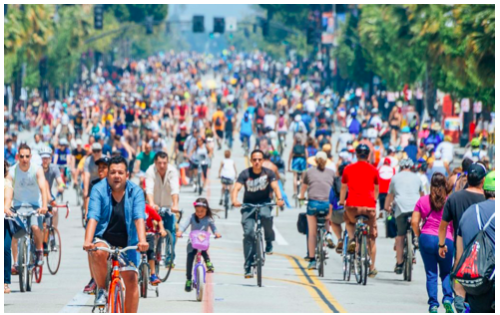CommentsSPECIAL CAPITAL AND MAIN REPORT--On June 15, 2003, before Los Angeles had its CicLAvia events, several thousand bikers and pedestrians descended upon the Pasadena Freeway for a bike and walk ride on the freeway. The event, called ArroyoFest, demonstrated the emerging capacity of LA bike groups. It also indicated a strong community presence in Highland Park, where the closing of the freeway for a few hours seemed like a magical moment.
Six years later, more than 600 bike and community activists gathered at LA Trade Tech for a Bike Summit. The summit included keynote speakers from New York and Mexico City, along with talks from Portland officials and planners, and workshops that covered topics from bike infrastructure to a “what next” discussion that became the seed for the development of the CicLAvia bike rides.
There was some dissension at the Bike Summit. Community activists from neighborhoods like Boyle Heights complained that street issues were absent from the discussion. It was not safe to ride bikes in places like Boyle Heights, where big-rig trucks coming from the ports clogged the streets on the way to nearby rail yards. Even then, the constant police presence, particularly in an immigrant neighborhood, made cyclists potentially vulnerable. “We need a street summit, not just a Bike Summit,” the community activists argued. The bike movement also needs to diversify, they said, to include the experiences and participation of many more Angelinos who are more dependent on biking, walking or taking the bus to work, to shop or to get to appointments.
The next year, a Street Summit did take place. Soon after, the first CicLAvia was held, on October 10, 2010. More than one hundred thousand Angelinos rode their bikes through surface streets closed to traffic in Hollywood, Downtown and East LA that Sunday morning. CicLAvia is now in its seventh year and the ride is as popular as ever, taking place in ever more neighborhoods.
This should be a moment where the LA bike movement can celebrate the increased popularity of biking, its modest, though important, breakthroughs in policy and bike infrastructure development, and the possibility of support across class and race lines. But then came the meltdown of the campaign of insurgent City Council candidate Josef Bray-Ali, a former bike shop owner and well-known cycling activist. Last April Bray-Ali was revealed to have made racist, fat-shaming and transphobic comments in an online discussion board. Bray-Ali, who would lose his City Council bid, had already been in sharp conflict with several people of color who were bike activists, including the director of the LA County Bike Coalition, over his disagreements and hostile and racially-tinged comments about his opponents in the bike world.
The Bray-Ali incident points to a deeper and still unresolved tension within the bike movement. The potential for a split along racial and class lines still remains. It continues to be exacerbated by the perception – and the reality — that when neighborhoods become bike-friendly they are seen to be more prone to displacement of low-income residents as gentrification kicks in. That phenomenon is not too different when artists move into those same neighborhoods.
But artists and bike riders can and must find common cause and a shared language with those residents and their neighborhoods. As with the shift from a Bike Summit to a Street Summit, the bike movement – and the communities fighting gentrification and displacement – would benefit from a linked agenda where issues of race, class, equity and inclusiveness are embedded in any campaign for bikeable, walkable, healthy, safe and affordable neighborhoods.
(Robert Gottlieb’s latest book, co-authored with Simon Ng, is Global Cities: Urban Environments in Los Angeles, Hong Kong, and China. He is the former Executive Director of the Urban & Environmental Policy Institute that hosted the ArroyoFest and Bike and Street Summit events. This is a Cap and Main
Special Report.)
-cw
Tags: Bikes, bikers, bike coalition, street summit, bike summit, Pasadena, Boyle Heights, LA County, ciclavia
















